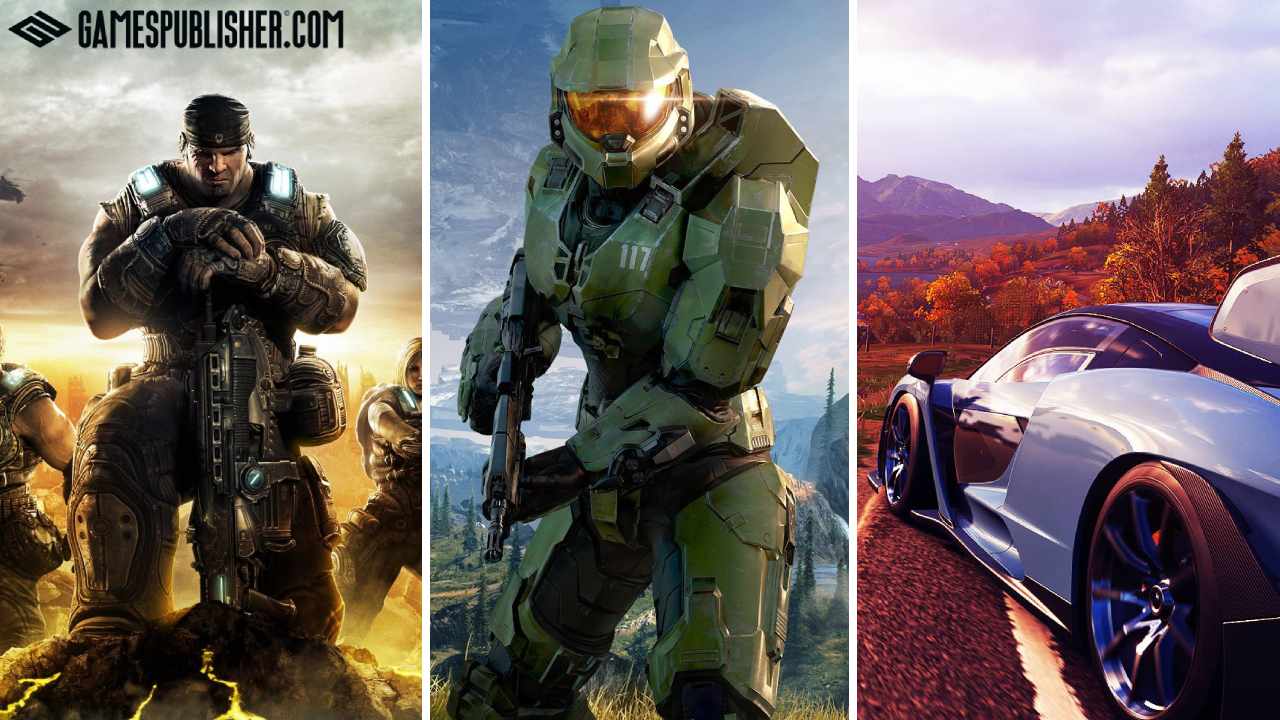Welcome to Gamespublisher.com, your one-stop hub for game development and video game publisher insights. Whether you’re coding the next big hit or just obsessed with game genres, we’ve got the scoop.
In this article, we’re diving into Microsoft games, spotlighting Xbox Game Studios—the powerhouse behind some of the biggest Microsoft Xbox games.
Originally Microsoft Studios, this division has grown into a titan of video game publishers, shaping gaming with iconic franchises and bold acquisitions.
Knowing the Microsoft games portfolio is a must for game developers and publishers tracking market trends, video game genres, and platform strategies.
Let’s explore how Microsoft game studios became a juggernaut and why their lineup matters!
Microsoft Games – A Quick History of Xbox Game Studios
Microsoft games kicked off with Microsoft Studios, formed in 2000 to publish Microsoft corporation games like Microsoft Flight Simulator and PC classics like Solitaire.
Rebranded as Xbox Game Studios (XGS) in 2019 to align with the Xbox brand, it’s now a cornerstone of Microsoft Gaming, led by CEO Phil Spencer since 2014.
XGS oversees game development for Xbox consoles, PC, and mobile, cementing Microsoft as the third-largest video game publisher by revenue, behind Sony and Tencent.
Major milestones include high-profile acquisitions:
- 2002: Rare ($375M) brought Banjo-Kazooie, Perfect Dark, and Conker. Later developed Viva Piñata (2006) and Sea of Thieves (2018).
- 2014: Mojang ($2.5B) added Minecraft, with 350M units sold, the best-selling game ever.
- 2018: Ninja Theory (Hellblade), Obsidian (The Outer Worlds), inXile (Wasteland), and others joined, boosting RPG and action game genres.
- 2021: ZeniMax Media ($8.1B) delivered The Elder Scrolls, Fallout, Doom, and Starfield via Bethesda.
- 2022: Activision Blizzard ($69B) added Call of Duty, Diablo, World of Warcraft, and Candy Crush, making Microsoft a game publisher giant.
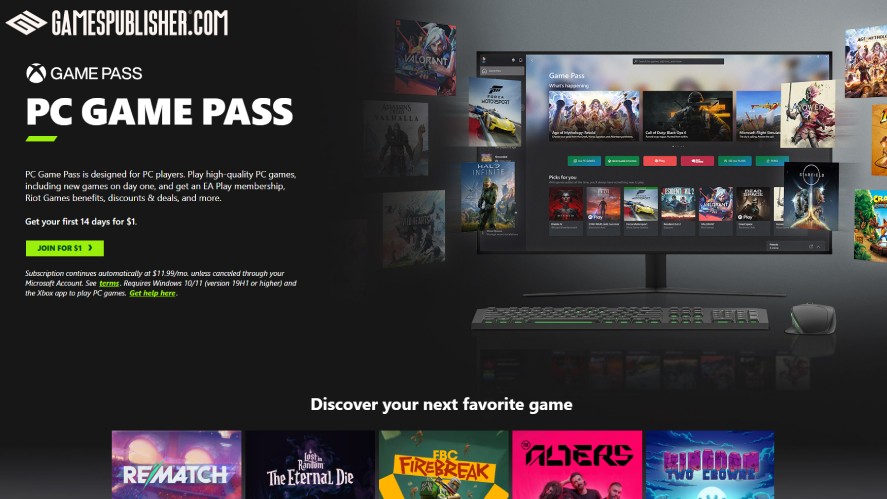
Microsoft Xbox Game Pass, with over 34 million subscribers in 2024, revolutionized game publishing by offering day-one access to XGS titles, driving player access and developer reach.
Although Game Pass’s value is noted, its growth has stalled recently, pushing Microsoft to multi-platform releases.
These moves make Microsoft games a trendsetter for game developers eyeing Microsoft Xbox games and subscription models.
Microsoft Games – First-Party Titles and Flagship Franchises
Microsoft’s gaming portfolio boasts some of the most iconic and influential franchises in the industry, spanning first-person shooters, racing simulators, sandbox creativity tools, and hyper-realistic flight experiences.
These first-party titles not only represent Microsoft’s commitment to diverse gameplay experiences but also showcase their technological innovation and global reach.
Halo Series
From its origins with Bungie to its current stewardship under 343 Industries, Halo has defined the Xbox brand and shaped the modern FPS genre.
Known for its epic sci-fi lore, competitive multiplayer, and iconic protagonist Master Chief, Halo has become a cultural and commercial juggernaut.
| Game Name | Release Date | Genre | Platform | Description |
|---|---|---|---|---|
| Halo: Combat Evolved | November 15, 2001 | FPS | Xbox, PC, macOS | The game that launched Xbox; introduced Master Chief and the Covenant. |
| Halo 2 | November 9, 2004 | FPS | Xbox, PC | Added online multiplayer and expanded the story. |
| Halo 3 | September 25, 2007 | FPS | Xbox 360 | Epic trilogy conclusion; introduced Forge and online co-op. |
| Halo: Reach | September 14, 2010 | FPS | Xbox 360 | Prequel depicting the fall of Reach; emotionally powerful campaign. |
| Halo 4 | November 6, 2012 | FPS | Xbox 360 | First 343i title; introduced Forerunners as key antagonists. |
| Halo 5: Guardians | October 27, 2015 | FPS | Xbox One | Squad mechanics and large-scale Warzone multiplayer mode. |
| Halo Infinite | December 8, 2021 | FPS | Xbox One, Xbox Series X/S, PC | Open-world elements and return to classic Halo sandbox combat. |
Forza Series
The Forza franchise splits into two subseries: Motorsport focuses on realistic circuit racing, while Horizon offers open-world arcade racing.
Developed by Turn 10 Studios (Motorsport) and Playground Games (Horizon), Forza is renowned for its visual fidelity, driving mechanics, and vibrant community.
| Game Name | Release Date | Genre | Platform | Description |
|---|---|---|---|---|
| Forza Motorsport | May 3, 2005 | Racing Sim | Xbox | Sim racing debut with tuning and career progression. |
| Forza Motorsport 7 | October 3, 2017 | Racing Sim | Xbox One, PC | 700+ cars, dynamic weather, eSports integration. |
| Forza Motorsport (2023) | October 10, 2023 | Racing Sim | Xbox Series X/S, PC | Franchise reboot with advanced physics and live track updates. |
| Forza Horizon | 23 October 2012 | Open-World | Xbox 360 | Laid-back arcade racing set in Colorado with festival theme. |
| Forza Horizon 2 | 30 September 2014 | Open-World | Xbox One, Xbox 360 | Road-tripped across Southern Europe with dynamic weather and expanded online play. |
| Forza Horizon 3 | 27 September 2016 | Open-World | Xbox One, PC | Set in Australia with four-player campaign co-op. |
| Forza Horizon 4 | 2 October 2018 | Open-World | Xbox Series X/S, Xbox One, PC | Set in the UK with dynamic seasons. |
| Forza Horizon 5 | 9 November 2021 | Open-World | Xbox Series X/S, Xbox One, PC | Expansive Mexican landscape with creator tools and live events. |
Gears of War Series
Originally created by Epic Games and later handed off to The Coalition, Gears of War defined the cover-based shooter and delivered gritty, cinematic storytelling.
It has remained a staple of Xbox multiplayer and esports scenes.
| Game Name | Release Date | Genre | Platform | Description |
|---|---|---|---|---|
| Gears of War | November 7, 2006 | Third-Person Shooter | Xbox 360, Windows | Pioneered cover-based shooting; introduced Delta Squad vs. Locust Horde. |
| Gears of War 2 | November 7, 2008 | Third-Person Shooter | Xbox 360 | Bigger battles and emotional depth. |
| Gears of War 3 | September 20, 2011 | Third-Person Shooter | Xbox 360 | Conclusion to the original trilogy with co-op for up to 4 players. |
| Gears of War 4 | October 11, 2016 | Third-Person Shooter | Xbox One, PC | A new generation of heroes and enemies. |
| Gears 5 | September 10, 2019 | Third-Person Shooter | Xbox One, Xbox Series X/S, PC | Kait Diaz leads a more personal and visually stunning campaign. |
| Gears Tactics | April 28, 2020 | Tactical RPG | Xbox One, Xbox Series X/S, PC | Strategic prequel set before the mainline Gears timeline. |
Minecraft
Acquired by Microsoft in 2014, Minecraft by Mojang is a global phenomenon.
Its sandbox creativity, survival gameplay, and educational applications have made it one of the best-selling games of all time.
| Game Name | Release Date | Genre | Platform | Description |
|---|---|---|---|---|
| Minecraft | 18 November 2011 | Sandbox, Survival | All major platforms | Open-world creativity and survival with infinite block-based worlds. |
| Minecraft Dungeons | May 26, 2020 | Action RPG | Nintendo Switch, PlayStation 4, Windows, Xbox One, Arcade | Multiplayer dungeon crawler with loot and co-op combat. |
| Minecraft Legends | April 18, 2023 | Action-Strategy | Nintendo Switch, PlayStation 4, PlayStation 5, Windows, Xbox One, Xbox Series X/S | Real-time strategy game with PvP and PvE elements in the Minecraft world. |
Microsoft Flight Simulator
Known for realism and stunning visual fidelity, Microsoft Flight Simulator is both a game and a technological marvel.
The 2020 edition utilizes Azure AI and Bing Maps for real-world geographic rendering.
| Game Name | Release Date | Genre | Platform | Description |
|---|---|---|---|---|
| Microsoft Flight Simulator | August 18, 2020 | Flight Simulation | PC, Xbox Series X/S | Photorealistic global simulation using Bing Maps and Azure AI. |
| Microsoft Flight Simulator 2024 | November 19, 2024 | Flight Simulation | PC, Xbox Series X/S | Expands into careers like aerial firefighting, rescue, and cargo missions. |
Microsoft Games – Recent and Upcoming Releases
Microsoft games keep the gaming world buzzing with a steady stream of releases.
Here’s a look at recent hits, what’s next, and how Microsoft Game Pass fuels game development innovation.
Recent Releases
- Starfield (2023, Bethesda Game Studios): This sci-fi RPG, dubbed “Skyrim in space” by director Todd Howard, launched to millions of players in three weeks. Despite mixed reviews (bugs, menu design gripes), its open-world galaxy with 1,000+ planets wowed explorers. Available day-one on Microsoft Xbox Game Pass, it drove subscriptions.
- Redfall (2023, Arkane Austin): A co-op vampire shooter, Redfall aimed for game genres innovation but stumbled with technical issues. Still, its open-world design drew some fans.
- Senua’s Saga: Hellblade II (2024, Ninja Theory): A visual masterpiece with Unreal Engine 5, Hellblade II elevated game development with motion capture and Icelandic landscapes. Its intense narrative and audio design shone, though some found combat slow.
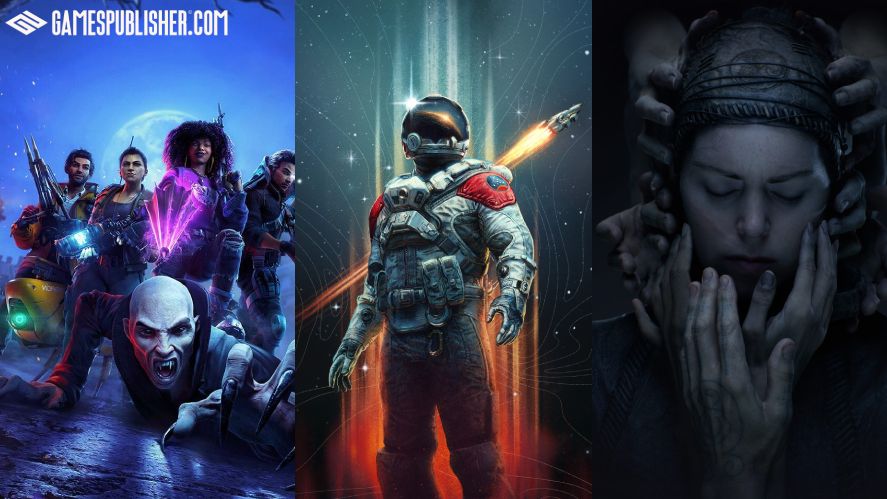
Upcoming Releases
- Avowed (2025, Obsidian Entertainment): This first-person RPG set in the Pillars of Eternity world promises deep combat and story choices. Slated for early 2025 on Microsoft Xbox Game Pass, it’s a fan-favorite after The Outer Worlds’ success.
- Fable (2026, Playground Games): A reboot of the iconic RPG, Fable blends humor and “hilariously British” vibes with Unreal Engine 5 visuals. Full production began post-Forza Horizon 5, with a 2026 Game Pass launch.
- The Outer Worlds 2 (2025, Obsidian Entertainment): A sci-fi RPG sequel, it expands on the original’s wit and choice-driven gameplay, launching at $79.99. A dedicated showcase followed the 2025 Xbox Games Showcase, signaling big Microsoft games hype.
- Gears of War: E-Day (2026, The Coalition): A prequel revisiting Emergence Day, it’s built in Unreal Engine 5 for gritty action.
Innovation via Game Pass
XGS uses Microsoft Xbox Game Pass to experiment with game genres, from Hi-Fi Rush’s surprise 2023 rhythm-action drop to Pentiment’s narrative-driven art style.
Day-one Game Pass releases let studios like Obsidian and Ninja Theory take risks, knowing players can try titles without a huge upfront cost.
This fuels game developers to push boundaries, like Hellblade II’s mental health focus or Avowed’s unique RPG systems.
Microsoft Games – Third-Party Partnerships and Published Titles
Microsoft isn’t just about first-party Microsoft Xbox games—it’s a video game publisher powerhouse through third-party deals and indie support.
From AAA blockbusters to quirky game genres, Microsoft game studios amplify diverse voices in gaming.
Notable Third-Party Microsoft Games
Microsoft has published heavy-hitters like Final Fantasy XVI and Persona 4 Revival, strengthening ties with Square Enix and Atlus.
Moreover, Call of Duty: Black Ops 7 premiered at the Xbox Games Showcase, showcasing Microsoft’s post-2023 acquisition muscle.
Indie Collaborations via ID@Xbox Program
The ID@Xbox Program nurtures indie developers, publishing gems like Hollow Knight: Silksong and Planet of Lana II.
Microsoft provides funding, dev kits, and marketing, helping indies like Thunder Lotus (Spiritfarer) reach millions.
Diverse Genres Approach
Microsoft funds varied game genres, from Invincible VS’s 2D fighting to Resonance: A Plague Tale Legacy’s narrative prequel.
By backing game development across action, RPGs, and indies, Microsoft appeals to all players.
This strategy shines in Game Pass, where video game publishers showcase everything from Super Meat Boy 3D to Ninja Gaiden 4.
Microsoft Games – Xbox Game Pass and Its Influence
Microsoft Xbox Game Pass isn’t just a subscription; it’s a game-changer for game development, game developers, and the gaming ecosystem.
With over 34M subscribers and growing, Game Pass reshapes how Microsoft games reach players and how video game publishers thrive.
Impact on Game Development and Discovery
Game Pass lets game developers experiment without the pressure of price tags.
Titles like Hi-Fi Rush and Pentiment found audiences via day-one Game Pass drops, with Hi-Fi Rush hitting 3M players despite no pre-launch hype.
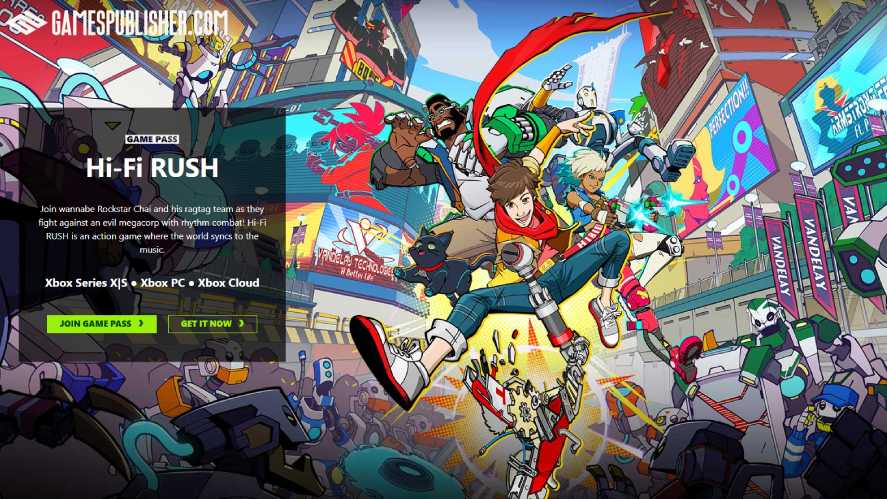
With Game Pass, players discover game genres they’d skip otherwise. This low-risk access boosts Microsoft games visibility.
Indie vs. AAA Devs
For indie developers, Game Pass offers funding and exposure, letting studios like Compulsion Games compete with AAA giants.
AAA game developers like Bethesda benefit from Game Pass’s scale, with Starfield driving subscriptions despite bugs.
However, AAA devs face pressure to justify $79.99 prices (e.g., The Outer Worlds 2). Game Pass balances this by guaranteeing revenue.
Ecosystem and Global Reach
Game Pass unites consoles, PC, cloud, and mobile, making Microsoft Xbox games accessible worldwide.
Users love gaming on phones or Firesticks, calling it unmatched value. This gaming ecosystem supports video game industry growth, with Microsoft adding Call of Duty to Game Pass, and expanding mobile reach via King (Candy Crush).
Microsoft’s global push ensures game developers reach diverse markets.
Microsoft Games – Studio Network Under Xbox Game Studios
Microsoft’s gaming empire is powered by Xbox Game Studios (XGS), a vast network of developers shaping the future of interactive entertainment.
Let’s explore the major studios behind the magic and how Microsoft’s strategic acquisitions have supercharged its publishing playbook.
Major Studios and Their Contributions
XGS is home to 20+ studios, each with its own strengths and fanbases.
| Studio | Description |
|---|---|
| 343 Industries (Redmond) | Experts in sim racing, they’ve crafted every Forza Motorsport title, including the 2023 reboot featuring 500+ cars and real-time weather, beloved by sim fans worldwide. |
| Turn 10 Studios (Washington) | Experts in sim racing, they’ve crafted every Forza Motorsport title, including the 2023 reboot featuring 500+ cars and real-time weather—beloved by sim fans worldwide. |
| The Coalition (Vancouver) | Took the reins of Gears of War from Epic Games in 2015. Released Gears 5 and is now working on Gears of War: E-Day, a prequel built in Unreal Engine 5. |
| Mojang (Stockholm) | The creative force behind Minecraft, acquired in 2014. With over 350 million copies sold, it remains the best-selling game of all time, spawning spin-offs like Minecraft Dungeons. |
| Rare (UK) | Legends behind Banjo-Kazooie and Perfect Dark. Their pirate-themed Sea of Thieves has drawn over 40 million players since 2018. |
| Obsidian Entertainment (California) | Masters of narrative RPGs, known for The Outer Worlds. Upcoming titles Avowed and The Outer Worlds 2 are Game Pass centerpieces. |
| Ninja Theory (UK) | Acclaimed for emotional storytelling in Hellblade: Senua’s Sacrifice. The sequel Senua’s Saga: Hellblade II continues their signature blend of cinematic visuals and psychological depth. |
| Bethesda Game Studios | Acquired via ZeniMax in 2021. Known for The Elder Scrolls and Fallout, they recently launched Starfield to players and are now working on The Elder Scrolls VI. |
| Arkane Studios | Creators of immersive sims like Dishonored and Prey. Despite Redfall’s lukewarm reception, their upcoming Marvel’s Blade has fans buzzing. |
| id Software | Pioneers of the FPS genre. DOOM (2016) and DOOM Eternal are high-octane showcases, with DOOM: The Dark Ages coming in 2025. |
Together, these studios showcase how Microsoft uses scale, specialization, and shared resources to dominate across game genres.
Recent Acquisitions and Their Impact
Strategic acquisitions have transformed Microsoft from a console brand into a cross-platform publishing titan:
- ZeniMax Media (2021, $8.1B): Brought Fallout, The Elder Scrolls, DOOM, and Starfield under Microsoft’s umbrella. These additions enriched the Game Pass library with genre-defining RPGs and shooters.
- Activision Blizzard (2022, $69B): Gave Microsoft access to Call of Duty, World of Warcraft, Diablo, and mobile mega-hit Candy Crush. This move boosts Microsoft’s presence across console, PC, and mobile.
- 2018 Acquisitions: Ninja Theory, Obsidian, and inXile added strong narrative and RPG talent, feeding into Microsoft’s commitment to single-player storytelling and Game Pass value.
These moves support a broader strategy to offer “games for everyone”, whether they play on console, PC, cloud, or mobile.
Microsoft Games – Legacy and Backward Compatibility Titles
Microsoft isn’t just chasing the next hit—they’re preserving the classics, too.
Through the Xbox backward compatibility program, over 600 titles from the original Xbox, Xbox 360, and Xbox One generations are playable today.
The Backward Compatibility Program was introduced in 2015.
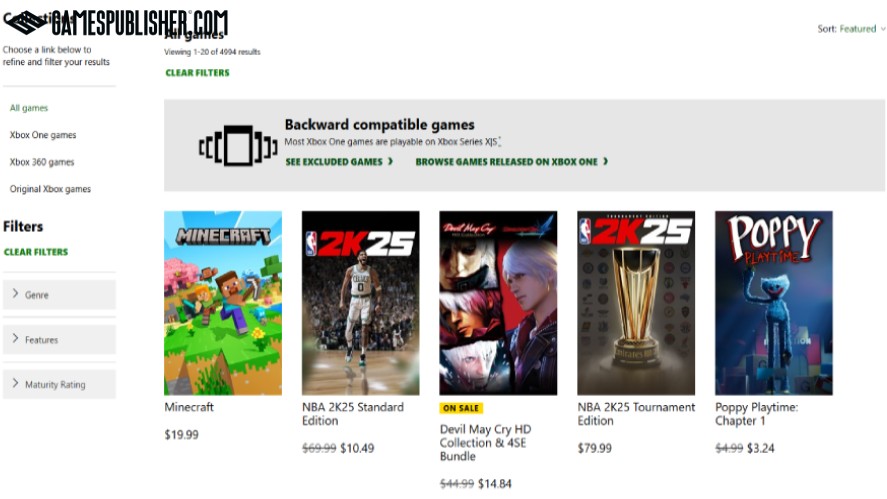
It enhances older games with 4K resolution, 60fps, and HDR, reviving fan favorites like Fable II and Halo 3. The final update in 2021 added 76 titles, including Max Payne and Skate 2.
With it, games like Mass Effect, Ninja Gaiden Black, and Sunset Overdrive remain playable and relevant.
Why does it matter?
This preservation effort helps developers study timeless design while letting players relive nostalgia. Few publishers rival Microsoft’s commitment to gaming history.
Microsoft Games – How Developers Can Learn from Microsoft’s Publishing Model
Microsoft’s unique publishing strategy offers valuable lessons for studios and publishers alike:
- Multi-Studio Network: With over 20 studios under one roof, Microsoft empowers specialized teams while encouraging knowledge sharing, like Obsidian learning RPG systems from Bethesda.
- Cross-Platform Development: Minecraft and Call of Duty show the power of building once and launching everywhere—Xbox, PC, mobile, and cloud.
- Live-Service and Subscription Focus: Game Pass isn’t just a product; it’s a platform. Games like Sea of Thieves and Hi-Fi Rush thrive with ongoing updates and instant access for subscribers.
- Support for Indies: Programs like ID@Xbox Program help indie developers fund and promote their work, bringing hits like Hollow Knight: Silksong to wider audiences.
- Intellectual Property Development: Microsoft invests in building strong IPs. Halo has generated $10B in revenue, while Minecraft continues to expand with films and spin-offs.
These strategies combine innovation, scalability, and community-building—a playbook other game developers can learn from.
Conclusion
From blockbuster franchises like Halo and Minecraft to the preservation of classics and pioneering cross-platform services, Microsoft’s game publishing strategy offers a masterclass in modern game development.
Xbox Game Studios’ multi-studio approach, paired with Game Pass and strategic acquisitions, positions Microsoft at the heart of gaming’s future.
Whether you’re a developer looking for publishing inspiration or a fan exploring what’s next, Microsoft games are worth watching closely.
For more breakdowns on publishing models and studio strategies, stick with Gamespublisher.com.
And if you’re hunting for your next obsession, check out the latest on Xbox Game Studios’ site or browse the Game Pass catalog—your next adventure might just be a click away.
Loading survey...

